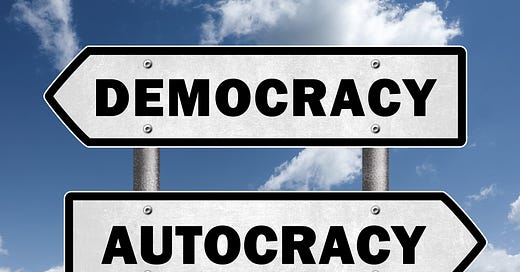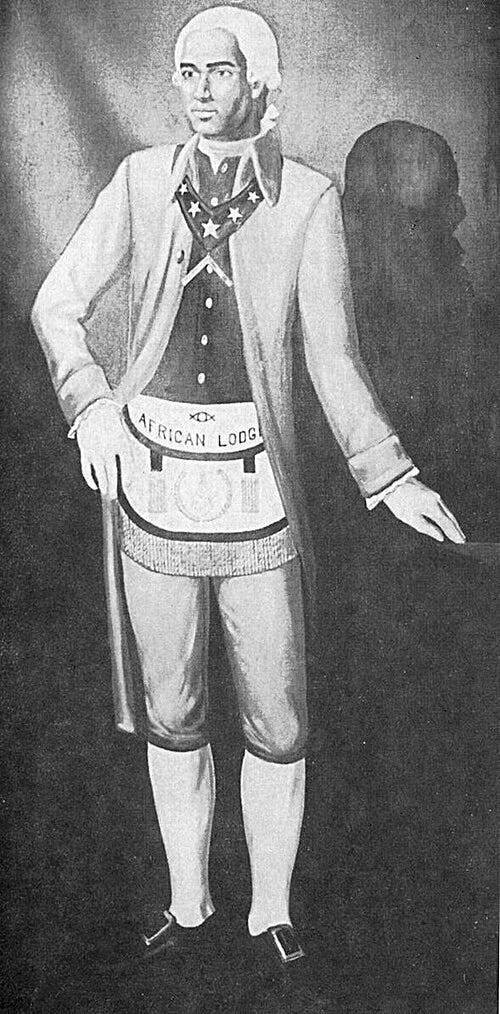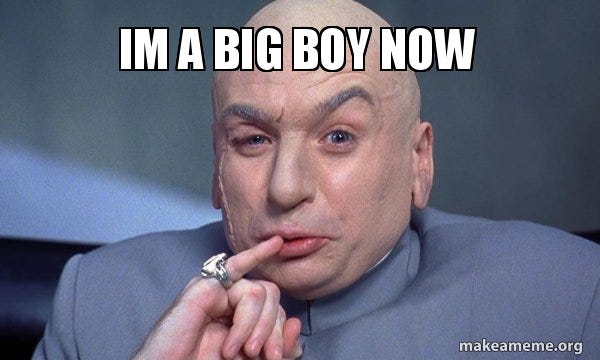Democracy Summer Week 4! Also, Psychological Constitutional #3, and the 2024 election revisited
Loyalty, Voice, and Exit
Hi all,
We’re now just past the midway point of Danielle Allen’s fantastic course:
We the People: Civic Engagement in a Constitutional Democracy
You too can join anytime and keep your own pace. As mentioned in the outset of this series, I signed up for the certificate so I could participate in the online forums, questions, and other assignments.
The main objective this week was understanding the
“philosophical foundations of democracy, including concepts of natural equality, and social contract theory, as well as exit, voice, and loyalty.”
We make these decisions of “exit, voice, and loyalty” in the context of political communities. A “social contract” is a “trade off between some freedoms for set of expectations placed on themselves and others, and enforced by government.” A community or faction has certain bonds of loyalty, offering some supposed benefits that outweigh the “costs” of membership.
According to political philosopher John Locke,
“a just social contract, the common good, could be realized, he argued, only by a government respecting and protecting the rights of the governed.”
“John Locke’s vision of the social contract gave us one picture of what a just political community would look like – one that respects people’s liberty, equality, and consent…That vision would inspire the signers of the Declaration of Independence. But of course, governments constantly fall short of these lofty expectations – what does the social contract look like from the perspective of a person living under it?”
“Locke and the signers of the Declaration thought that if the social contract was broken, the people should take up arms in revolution. That’s a high bar.”
“Writing in the 1970s, economist Albert O. Hirschman offered a more nuanced vision” (of loyalty, voice and agency, and exit)"
From our founding, America has rebelled against tyranny, and declared itself for liberty, freedom and “unalienable rights.” We have always struggled with biases of a dominant or dominating group, and the centralization of power. Clearly, tyranny exists when a centralized power idealizes itself and is extremely biased against others. This leads the way to the deprivation of liberties and rights, and the subordination of all to a tyrannical rule.
America rebelled against monarchy, and yet some saw the Presidency as potentially an elected Monarchy.
Check.
The struggle against bias, tyranny, and monarchic rule is essential. It is at the very heart of our human struggle. We should promote systems that uncover and ameliorate, deconstruct, and overcome bias and selfishness, and promote egalitarian relationship. What has happened now, politically, is that the worst tendencies of the American and human mindset have been exposed and inflamed.
We have been overtaken by illness, and our immune system is activated. Now we have to fight the illness, and in so doing, come to a deeper understanding of the body of humanity, perhaps even create a deeper, shared understanding.
We have no choice but to oppose the tyrannical rule of Mr. Trump, and begin the long labor of constructing something better on the grounds of mental health and social wellbeing. Mr. Trump and his movement are clearly aimed at the destruction of what has been built up over centuries, however imperfectly. I am doing my best to understand the situation and use my voice to help myself and others, while truing and staying true to relatedness.
I don’t see “exit” as an option at this point - but rather a radical recalibration to the roots of our humanity. Finding my personal truth(s), staying true, and hopefully helping others stay true as well - as Mr. Trump and crew perform their lie and delusion.
Allen illustrated the conflicts of loyalty, voice, and exit in the story of the incredible Prince Hall (c. 1735/8 – December 7, 1807), who rose to prominence as a voice for abolition during the American Revolutionary Era. See this article for clarity:
Allen, D. (2021, March). A forgotten black founding father. The Atlantic, March, 2021
Prince Hall was a man eminently of his times, petitioning the state of Massachusetts for abolition at age 21. He based his arguments on Locke, Aristotle, and the Declaration of Independence. Locke provided arguments about the natural rights of mankind, Aristotle emphasized the significance of society to promote justice, and the Declaration proclaimed all these: unalienable rights of man, the establishment of government to secure those rights, and the right of citizens to alter, change, or even abolish and reconstruct their government to better provide safety and happiness. The Massachusetts government was constructed in a way that denied the basic, unalienable, and natural rights of Black citizens.
Hall’s ideas may not have achieved their initial goal in 1777, but as they gained in power, they found articulation in the new political institutions of the post-revolutionary era.
While abolition was a victory for racial equality in Massachusetts, much remained the same. Free blacks still faced extreme poverty, deep racial discrimination, and few opportunities for education or social advancement. Even as the new Commonwealth began to develop publicly funded schools for its white citizens, African-Americans were conspicuously left out. And on the streets, blacks were subject to constant harassment by whites and occasionally kidnapped and reenslaved in the Caribbean. As Prince Hall would recall in a speech toward the end of his life, “the daily insults you meet with in the streets of Boston… how are you shamefully abus’d and that at such a degree, that you may truly be said to carry your lives in your hands; and the arrows of death are flying about your heads.” Hall’s efforts to gain new protections and opportunities for the black community fell on deaf ears. By 1787, Hall felt he had exhausted many of his options for exercising his voice…
After Prince Hall’s petition for abolition, he later submitted two more petitions to the Massachusetts legislature -- one for support for a return of his community to Africa, the other for resources to support education for African American children in Boston.
Both petitions attracted attention of white legislators. However, there were no funds for the tran-Atlantic option, which was also seen as potentially dangerous by Blacks. The petition for equal education failed, but
“Hall joined with his son Primus to open an independent school for black children funded by the community. And he continued to fight for racial justice in Massachusetts. In 1788, three sailors who belonged to Hall’s Masonic lodge were kidnapped and re-enslaved by the slave traders who continued to use Massachusetts ports. Hall wrote another petition demanding Massachusetts Governor John Hancock rescue the kidnapped Masons and ban the trade of persons in the commonwealth. Hall’s petition circulated widely among white abolitionists, bringing his demand for justice to a wide audience and leading the Massachusetts legislature to barring ships engaged in the slave trade from Massachusetts ports. Hancock helped secure the release of the kidnapped sailors who safely returned to Boston.
Prince Hall spent the rest of his life fighting for racial equality. In his last public speech in 1797, he emphasized that “Although [African Americans] are deprived of the means of education, you are not deprived of the means of meditation; by which I mean thinking, hearing and weighing matters, men, and things in your own mind, and making that judgment of them...” Intellectual independence would empower African-Americans to keep using their voice. He evoked the recent achievement of black freedom in the Haitian Revolution as an inspiration to build a new society that lived up to the principles of the Declaration, transformed from “a sink of slavery to freedom and equality.”
Hall was an incredible visionary - seeing hope and promise in the possibilities of America, and committing himself to the fight for liberation of Blacks, and indeed, free all Americans from their biases towards Blacks. Learning about him and the ideas of loyalty, voice, and exit was powerful.
I tend to be loyal, and have difficulty if the group, organization, or relationship - are not reasonably loyal to the principles that are important to me. I recognize we are all works-in-progress, and that tempers the myriad frustrations that come up in the course of human relationships. It’s just a call for me to “see more clearly, and love more deeply.” But yes, I still have fire in me.
I chose human dignity as my most prominent value, along with freedom of expression and mind. This can feel like an upstream and idealistic battle, while others in my communities are more pragmatic about strictly “mental health and substance abuse policy,” or are ambivalent about, say, the lives and value of minorities here, or Palestinians abroad, etc. It’s quite dismaying indeed. But instructive in its challenge.
Bombing Iran last weekend seems like a really bad idea, and certainly a threat to rule of law.
Has America fully lost its mind? How do we exit the dangerous and downward spiral? How should we cultivate loyalty to our ideals, and also use voice to improve the situation?
Mr. Trump said of Iran and Israel this week, “they don’t know what the f#@$ they’re doing.”
This seems a massive projection and an attempt to expel his own ignorance onto others. I’ve pointed out that on a very basic level, we are all at least a little confused. Mr. Trump is no exception. Unlike most human beings, he proclaims himself a know-it-all and judge on others. He doubles and triples down into endless self-justification and aggrandizement. Israel, Iran, and now the US have thrown bombs at an uncertain and dangerous situation.
I think there were more diplomatic and de-escalating ways to deal with uncertainty and danger. Now that all that ordnance is out of Trump’s system, including the F-bombs, he is momentarily “clear,” having asserted himself. He’s taken his big dump, and he’s quite proud. “Me make things go boom!”
You’ve made your point, I suppose. “Who’s the big boy? Yes, who’s the big boy?”
But uncertainty and danger are still present, but now with even less trust in allyship or negotiation with America.
But Mr. Trump can see the biggest danger. All he has to do is look in the mirror. And stay away from all the big buttons and control knobs, even the gold-plated ones.
“Self-reflective capacity! Activate!”
(A little do unto others as you would have them do unto you would be nice, as a start…)
Psychological Constitutional #3
There are many ways to dissect our current difficulty, but I think that unrestrained greed, hatred, and selfishness (the three poisons of Buddhism) really nail it, all really embodied in Mr. Trump and his faction. Sure, we have to have a system that limits these and removes them from power, but we also have to work on ourselves. Mr. Trump just reveals all that has come between us and led us astray
Society is the sum of our love, and it is a mixed bag. Can we help make it more loving, compassionate, and kind? Can we create more belonging, safety, justice, and equality? This is an intrapsychic and interpersonal problem. The collectivity of America is an object of inquiry and frustration. It will be the death of us all unless we help the durn thing pull up. I think we are entering into a decades-long journey of growth and renewal, but we have to be sure we sail on the winds of our values, and not simply short term expediency.
Disgust, contempt, and resentment have risen to the top of our thinking apparatus, embodied, again, by Mr. Trump, rather than love, compassion, understanding, and reason. America and the world’s safety and happiness are imperiled by Mr. Trump’s delusional grandiosity which seems to fit like a key in lock with half the population’s grandiosity fetish. What’s pervasive becomes convincing, through confirmation bias and tautology. “He must be right, because he’s famous, and now he’s president, so he must be right.”
Uh, no. Bad ideas sometimes get a full head of steam. Head strong and dead-wrong.
Mr. Trump actually believes he knows better than the generals, the intelligence community, scientists, etc. He and the media apparatus have made him a celebrity, and thus he gets to promote his brand of competitive and contemptuous antagonism to the masses. That’s what “winning” has become to modern America, and that’s what we need exit from. But I guess we need to acknowledge that contempt is potent, and drives many to obedience to avoid the wrath of his cultural force. Disagreeing with him triggers death threats and unleashes sadism online and IRL. I mean, what a monstrous way of being.
People have been assassinated in recent weeks. And that’s just a “news cycle,” which prompts us to think that the loss of human life is inevitable and trivial.
No. Just no.
We need to exit the insanity of selfish delusion, greed, and hatred, and into … well, enlightened self-interest at least, and more idealistically, selflessness, service, and the common good.
Coda - the 2024 election revisited
Igielnik R, Goldmacher S. Trump Won by Turning Out Voters and Building a Diverse Coalition, Report Finds. NY Times, June 26, 2025 (gift article)
My takeaway: people[le were dissatisfied, and did not deal rationally with dissatisfaction. Dissatisfaction was manufactured and mobilized by Trump et al. Negative campaigning works - it makes people unhappy and feeds on their unhappiness. Mental Health and social well-being matter. We have to have rational and compassionate ways of dealing with dissatisfaction. The people want to be “championed,” but they got the wool pulled over their eyes by a snake-oil salesman who teamed up with malicious online actors such as Elon Musk.
Warmly,
Ravi







